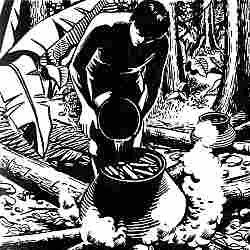|
|
|
57. Flying Death
When this peculiar quality was brought to the
attention of the
medical profession years ago, it raised the hopes for a much-needed
treatment for a very special group of patients. In the United States
there were over two hundred thousand cases of a peculiar illness
involving violent contractions of the muscles. Now since Curare
produced just the opposite effect, it was felt that the obtaining of a
test sample was of major importance to the medical scientist. Richard
Gill made a successful search for the "flying death" and the process by
which it is brewed in the Ecuadorian jungle. His own story of the
adventure is told in the book WHITE WATER AND BLACK MAGIC.
 From the comparatively large amount of material brought back from
the jungle pharmacy, many tests were made. A process of purification
was devised, and studies on how to make it synthetically were started.
The size of the dose for medical use was very carefully determined and
the practical knowledge of the jungle converted into our modern
scientific terms. Clinical tests were started and a group of patients
unable to talk intelligently, write or feed themselves, were so relaxed
by very small doses that they could approach a more normal life soon
after the treatment started.
From the comparatively large amount of material brought back from
the jungle pharmacy, many tests were made. A process of purification
was devised, and studies on how to make it synthetically were started.
The size of the dose for medical use was very carefully determined and
the practical knowledge of the jungle converted into our modern
scientific terms. Clinical tests were started and a group of patients
unable to talk intelligently, write or feed themselves, were so relaxed
by very small doses that they could approach a more normal life soon
after the treatment started.
|
|
 From the comparatively large amount of material brought back from
the jungle pharmacy, many tests were made. A process of purification
was devised, and studies on how to make it synthetically were started.
The size of the dose for medical use was very carefully determined and
the practical knowledge of the jungle converted into our modern
scientific terms. Clinical tests were started and a group of patients
unable to talk intelligently, write or feed themselves, were so relaxed
by very small doses that they could approach a more normal life soon
after the treatment started.
From the comparatively large amount of material brought back from
the jungle pharmacy, many tests were made. A process of purification
was devised, and studies on how to make it synthetically were started.
The size of the dose for medical use was very carefully determined and
the practical knowledge of the jungle converted into our modern
scientific terms. Clinical tests were started and a group of patients
unable to talk intelligently, write or feed themselves, were so relaxed
by very small doses that they could approach a more normal life soon
after the treatment started. 







